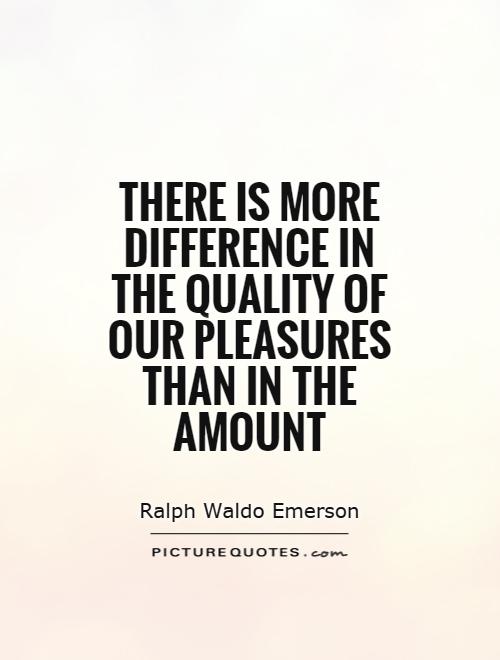There is more difference in the quality of our pleasures than in the amount

There is more difference in the quality of our pleasures than in the amount
Ralph Waldo Emerson, a renowned American essayist, lecturer, and poet, was a firm believer in the idea that the quality of our pleasures far outweighs the quantity. In his works, Emerson often emphasized the importance of seeking out meaningful and fulfilling experiences over simply indulging in superficial or fleeting pleasures. This sentiment is perfectly encapsulated in his statement, "There is more difference in the quality of our pleasures than in the amount."Emerson's philosophy on pleasure can be seen as a reflection of his broader views on life and human nature. He believed that true happiness and fulfillment could only be achieved through the pursuit of higher ideals and the cultivation of one's inner self. In this sense, Emerson was a proponent of living a life of purpose and meaning, rather than simply chasing after material wealth or superficial pleasures.
When Emerson speaks of the "quality" of our pleasures, he is referring to the depth, significance, and lasting impact of the experiences we choose to engage in. For him, true pleasure comes from engaging with the world in a meaningful and authentic way, whether through art, nature, relationships, or personal growth. These are the experiences that enrich our lives, nourish our souls, and bring us true joy and fulfillment.
On the other hand, the "amount" of our pleasures refers to the sheer quantity or volume of experiences we accumulate. Emerson suggests that it is not the sheer number of pleasures we indulge in that ultimately matters, but rather the quality of those experiences. In other words, it is better to savor a few truly meaningful and enriching experiences than to mindlessly consume a multitude of shallow or fleeting pleasures.












 Friendship Quotes
Friendship Quotes Love Quotes
Love Quotes Life Quotes
Life Quotes Funny Quotes
Funny Quotes Motivational Quotes
Motivational Quotes Inspirational Quotes
Inspirational Quotes